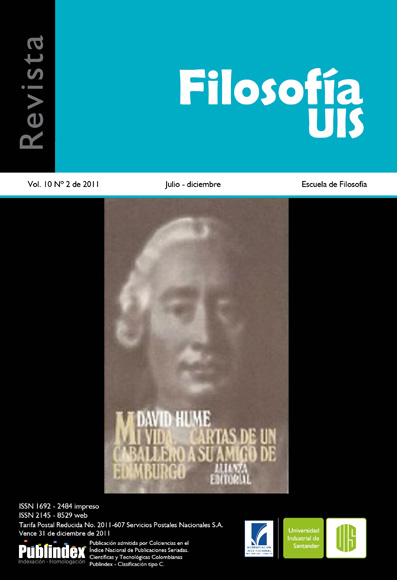Research Article
Published 2011-10-10
Keywords
- God,
- nihilism,
- secularization
How to Cite
González Suárez., L. (2011). Secularization, nihilism and God’s eclipse. Revista Filosofía UIS, 10(2), 159–175. Retrieved from https://revistas.uis.edu.co/index.php/revistafilosofiauis/article/view/2849
Copyright (c) 2011 Lucero González Suárez.

This work is licensed under a Creative Commons Attribution 4.0 International License.
Abstract
The secularization, historical phenomenon established in the history of the being who takes place in the bosom of the Christianity, is a manifestation of the nihilism -destination and consummation of the western metaphysics. The nihilism takes as a reason the "God's death“: the exposure of the underlying suppositions to the God's onto-teo-logical concept, who on having had lost his efficiency to enunciate and to provoke the meeting with the Saving Mystery, contributes to the eclipse of the sacred thing.
Downloads
Download data is not yet available.
References
- Buber, Martin (2003). Eclipse de Dios, Salamanca: Sígueme.
- Borghesi, Massimo (2007). Secularización y nihilismo. Cristianismo y cultura contemporánea, Madrid: Encuentro.
- Heidegger, Martin (2001). “La frase de Nietzsche Dios ha muerto”, en: Caminos de bosque, Madrid: Alianza.
- Löwith, Karl (1968). De Hegel a Nietzsche. La quiebra revolucionaria del pensamiento del siglo XIX, Buenos Aires: Sudamericana.
- Marramao, Giacomo (1998). Cielo y tierra: genealogía de la secularización, Barcelona: Paidós.
- Muñoz, Jacobo (2005). “Nihilismo y crítica de la religión en Nietzsche”, en: Filosofía de la religión. Estudios y textos, Madrid: Trotta.
- Nietzsche, Federico (1932). “El gay saber”, en: Obras completas, tomo V, Madrid: Aguilar.
- Vattimo, Gianni (1996). Creer que se cree, Barcelona: Paidós.
- Zambrano, María (2007). El hombre y lo divino, Madrid: Fondo de Cultura Económica.
